|
58 Maison Dieu Road
Dover
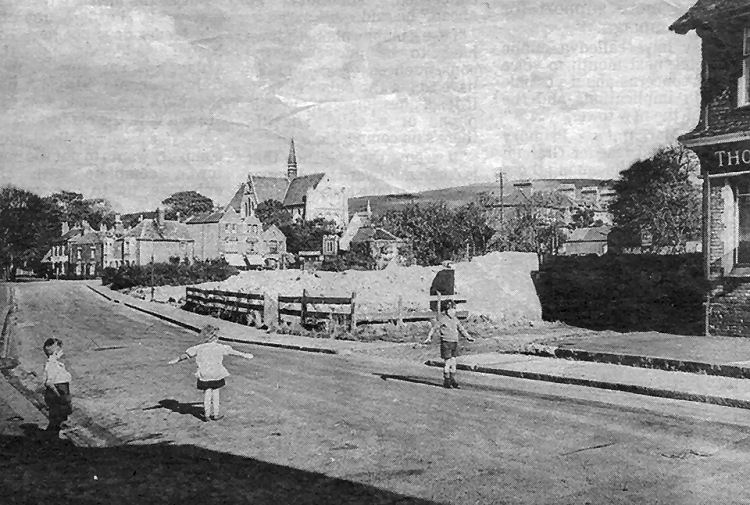
Above photo, 1947, just showing the corner of the pub. Kindly sent by
Rosmany Wells. |
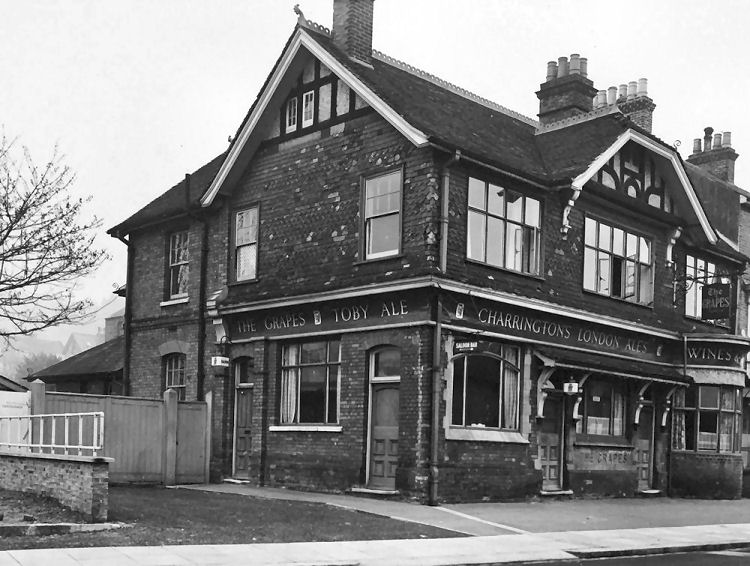
Above photo 1952.
Creative Commons Licence. |
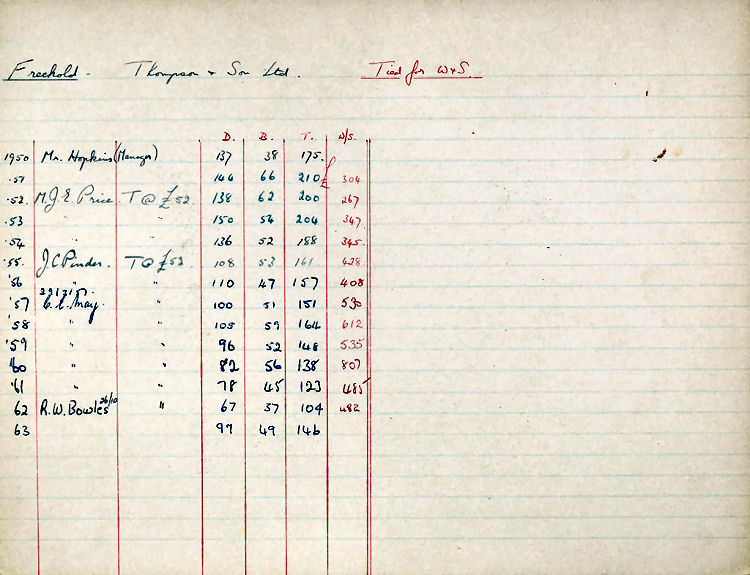
Thomspon & Son ledger.
Creative Commons Licence. |

Above photo kindly supplied by Jeanette Harper, c/o Jackie Bowles of
the Louise Armstrong.
Date circa 1960.
|
|
From the Dover Express and East Kent Intelligencer, 27
February, 1864.
A GAME TOO MANY
George Cook, a carter, was summoned for leaving a cart longer than
was necessary for loading or unloading the same. Mr. Knocker appeared in
support of this information also.
Police-constable Jones stated that he saw the defendant's cart
unattended outside the "Grapes" public-house, Maison Dieu Road, on
Thursday, from forty minutes past three till ten minutes past four. He
had previously seen the horse and cart standing there for an hour and a
half. Upon the defendant coming out of the public-house, he said he
would move away as soon as he had "finished another game." - The Bench
fined the defendant 5s., and 7s. costs which he paid.
|
The original was built in 1862 and it was sold together
with four others belonging to Mrs. Harding in 1890. It realised £1,200. It
had been built forward of the building line and created a danger by 1893. It
was therefore removed and following a road widening was re erected further
back.
|
From the Dover Express and East Kent Intelligencer,
10 September, 1869. Price 1d.
ASSAULTING THE POLICE
Jack Hicks, a labourer, was charged with assaulting a
police-constable while in the execution of his duty on the Maison Dieu
Road.
Police constable Nash said that from information he received he went
to the "Grapes Inn," Maison Dieu Road, and saw the landlord, who gave a
man into his custody on a charge of assaulting him and his wife. When he
had the man in his custody, the prisoner threatened to punch his (the
policeman's) head. On witness telling him to mind his own business, he
struck witness a blow on the head, and witness took the prisoner into
custody. He was very violent, and witness had to obtain the assistance
of Police-constable Faith in order to handcuff him, and he was then
taken to the station-house. The other man that witness had in his
custody succeeded in getting away during the scuffle, and he then made
good certain damage he had done, after which the landlord refused to
give him into custody.
The Magistrates fined the prisoner 10s., and the costs 6d.; in
default, fourteen days' imprisonment.
|
|
From the Dover Express and East Kent News, Friday,
22 October, 1869.
SUNDAY WARNING "HALF AND HALF"
William Charles Wilson, landlord of the "Grapes" public-house was
summoned on the information of Police-sergeant Stevens for having his
house open during illegal hours on the 17th.
The defendant did not appear, but his wife was present and said
he was unable to stand, and he could not be squared from his work.
Superintendent Coram having proved the service of the summons,
Police-sergeant Stevens said: that on Sunday morning last, about
half-past nine, he was passing the "Grapes," Maison Dieu Road, having
just previously visited it, when he saw a boy named Collard come out of
the house with a jug in his hand containing "half-and-half," newly
drawn. In consequence of what the boy said, witness went into the house
and saw the landlord's daughter, who admitted drawing the liquor. The
landlord was also present when he spoke to the daughter, and he said he
was very sorry.
The boy, John Collard, 15 years of age, living at Prospect Cottages,
Charlton, said he went into the "Grapes Inn" on Sunday morning
last, to fetch some beer and porter. he went into the house and asked
for it. The daughter of the landlord drew it and he paid one penny for
it.
In reply to the Bench, Superintendent Coram said the house was very
respectably conducted.
The Magistrates fined the defendant 5s. and the costs, 16s., which
was paid.
|
|
From the Dover Express and East Kent Intelligencer, 16 September, 1870. Price 1d.
THE ANNUAL LICENSING DAY
SUNDAY TRADING
The landlord of the “Grapes,” Mr. C. Wilson, had also been convicted
of keeping his house open on the Sunday; but on being reminded of the
circumstance he professed to have no recollection of it, and it was not
till the date of the conviction was searched out by the Magistrates'
Clerk that his memory was sufficiently refreshed to remember it. The
presiding Magistrate regretted that Mr. Wilson had so faulty a memory,
because it was probably that he would go away and forget what had
occurred that morning, and what the Magistrates were now going to tell
him. (A laugh.) This was, that if he again offended in this particular
he would in all probability have his licence taken away; and although
the applicant might have an imperfect recollection of what passed before
the Magistrates, he might inform him that a record of their transactions
was kept, and the recollection of the Magistrates themselves was not so
defective. If there were any repetition of this complaint, and he (Dr.
Astley) was upon the Bench, he should think it his duty to endeavour to
withhold the licence.
|
Henry Gray, licensee of the "Grapes" from circa 1876 to 1913 must have
been involved with the demolition and building of the new pub as he spans
the years of old and new. According to the Earl of Radnor County Estate
Records, he was also owner of No. 2 Halton Copyhold, cottage garden & 3
roods meadow; pasture land at Chalksole Green, Alkham; in 1906 he pays 2s.
3d. quit rent. (Quit-rent is a form of tax or land tax imposed on freehold
or leased land by a higher landowning authority, usually government or its
assigns.)
1950 saw an application to "full" license approved, allowing the pub to
sell beers and spirits.
Once an outlet of Bass Charrington but owned by Robert (Bod)
Bowles since 1972 who declared it a free house, changed the sign to "Louis
Armstrong" and provided music with his own band.
|
From the Dover Express and East Kent Intelligencer,
31 May, 1872. Price 1d.
APPLICATION TO DRAW
Mr. Coleman applied that Mr. George Moneylaws, recently carrying on a
grocery business at Aldington, might be allowed to draw at the "Grapes
Inn," Charlton, in place of the present tenant, Mr. William Charles
Wilson, until the next transfer day.
Testimonials to character were handed in from the Churchwardens of
Aldington.
It appeared that the present tenant, Mr. Wilson, had occupied the
house for seven years.
Superintendent Sanders said there was one conviction against the
house, about a twelve month ago; but he should raise no objection to the
proposed transfer.
The Bench thereupon granted the application.
|
|
From the Dover Express and East Kent News, Friday, 3 October, 1890. Price 5d.
PROPERTY SALE
At the Auction Sale at the “Royal Oak Hotel,” yesterday, by Messrs. Terson and Son, No. 45, Seven Stars Street, sold for “165, and 58,
Maison Dieu Road, sold for £205. The latter was bought by Mr. Thompson,
who was also the purchaser of the “Grapes Inn.”
Yesterday afternoon Messrs. Terson and Son offered five public houses,
the property of Mrs. Harding, for sale by auction at the “Royal Oak
Hotel.” The “Grapes,” Maison Dieu Road, sold for £1,200.
|
|
From the Dover Express and East Kent News, Friday, 24 February, 1905. Price 1d.
BURGLARIES AT CHARLTON GREEN
At an early hour on Saturday morning, entrances were effected to the
“Sportsman” and “Grapes Inn” at Charlton Green. From every appearance
and certain information that the Police possess, there seems to be no
doubt that these two robberies are part of a series of burglaries that
were committed last week successively at towns between Dover and
Chatham. The entrances were effected from the back with considerable
skill, for at the “Sportsman” there was a god in the yard, and that was
not even disturbed, whilst at the “Grapes” there were three dogs in the
house, and these were also not aroused. At the “Sportsman” a sum of
under two hundred pounds was taken, whilst at the “Grapes” under five
pounds was stolen, and in addition a few articles were taken at the
“Sportsman” in the way of a silver spoon, etc.
Two men visited both houses just before closing time, and finished up at
the “Red Lion,” which they left when the house was closed, and they no
doubt then secreted themselves and subsequently submitted the robbery.
The Police are dealing with the matter.
|
|
From the Dover Express and East Kent News, Friday, 17 March, 1905. Price 1d.
SMART CAPTURE OF A BURGLAR
DOVER POLICE MAKE AN IMPORTANT HAUL
On Wednesday evening the Dover Police made a capture that will probably
break up a dangerous gang of burglars who have been committing a
succession of serious robberies in East Kent. It will be remembered that
some few weeks ago at the “Grapes” public house and the “Sportsman”
public house in Charlton Green were both entered on the same night, and
a quantity of money taken. The entrances were effected from the back,
and of course as the Police have no access to that part, they had no
chance of capturing the robbers red handed. However, when the matter was
brought to their notice, they made very careful enquiries, and those
enquiries had the effect of making the important capture that was made
on Wednesday evening. It seems that one of the refreshment houses in
Dover, 23, Snargate Street, it was reported that two men took rooms on
this night, but they were absent all night, and did not return, saying
that they were going to see a friend of theirs in the Buffs, named
Rawlings. This aroused the suspicions of the Police, and on making
further enquiries they discovered that there was no such man in the
Buffs as Rawlings. One of the men had left at the refreshment house a
black bag, and the Police asked the landlady in the event of the men
returning for it, to at once inform them. On Wednesday night they came
back and asked for the bag. The landlady at once went to the top of the
street and told the Constable on duty there that the men had come for
the bag, and the Constable, meeting them coming out, stopped the man
with the bag; and two who were in his company walking on. The man not
answering the Constable's questions satisfactorily, he felt justified in
taking him to the Police Station. There nothing at first could be found
to connect him with the Charlton Green burglaries, and he was put into
the cells as a deserter because he was wearing military socks. Some keys
that were found on him, and after found to have been taken from the
“Grapes,” proved to be a very conclusive connecting link, and there is
little doubt but that a most important capture has been made.
Amongst the property found on the man, was a silver tobacco box, part of
the proceeds of a burglary at Rochester, previous to the Dover
burglaries, and, in addition, we understand that other property was
found on him that was taken in some of the many other burglaries that
have been startling East Kent, and one very serious one that took place
at an important Kentish town only a couple of days previously. We
understand that the other two men made good their escape by inducing the
Railway officials to allow them to go on a special train that happened
to leave Dover before the importance of the capture was realised. The
Dover Police have undoubtedly made a very smart capture, due entirely to
the thoroughness with which they pursued their original enquiries. The
first hearing of the case took place at the Dover Police Court
yesterday, before H. W. Thorpe and F. G. Wright, Esqrs.
Arthur Thomas, 22, who said that he was of no fixed residence, Mile End
Road, a trimmer, was charged with being concerned with another man, not
in custody, with breaking and entering the “Grapes” public house, Maison
Dieu Road, during the night of the 17th of February, 1905, and stealing
from the bar £4 in money, and a bunch of eight keys, value together £4,
the goods and money of W. H. Gray.
William Henry Gray, landlord of the “Grapes Inn,” Maison Dieu Road,
said: On Friday, February 17th, I shut up the house as usual at 11
o'clock. I did not go to bed till one o'clock, and then went round the
premises to see that all was safe. Soon after I went to be I heard a
noise, but thought it came from my neighbours, as we can hear noises
plainly through the walls, and took no notice of it. I got up at eight
o'clock, and found that the house had been broken into. The barmaid had
just gone down before me, I went into the kitchen and found the window
open. The lower sash had been forced up, the fastening having been
broken. The spade now produced is my property and was kept in the garden
by the tool house. It was found in the bar parlour, bent. The marks on
the window corresponded with it. When I went to bed there were some
large glass bottles on the kitchen table, inside of the window, and
these were removed outside the house to enable a person to get through
the window, which was four or five feet from the ground. On going into
the bar I found that a drawer behind the counter was gone. It was found
in the bottling place at the back of the bar parlour. The drawer, which
was locked, contained about three or four pounds in money. There was
half a sovereign and some silver in a bag. I had not counted the money.
I had counted the bulk of the money, which I had carried upstairs with
me, and had left this downstairs for the next morning. The coppers and
the bag of money were gone when I found the drawer. The keys produced
were amongst the coppers, and are my property. When I was shown them the
other day I at once recognised them as my property. The drawer had been
opened by forcing the bolt of the lock. The bar parlour, which also
looks on to the back, was broken into. The glass by the catch had been
smashed and the catch broken. In the parlour was the iron crowbar
produced, two spades, and the garden fork. They had tried to force the
door of the room leading into the passage, but had not succeeded, and
then apparently went to the scullery window, which had been tampered
with. The entry was then apparently effected through the kitchen window.
There was a dog, a spaniel, asleep on the kitchen table all the time.
Another was upstairs in the barmaid's bedroom, and another outside. The
dogs had been doctored, and were not well for three or four days.
Usually they barked when the Police came to try the house. There was not
a whimper from them for three or four days. They had been out in the
street after closing time, and had to be called in, a thing that is
quite unusual. My cash box, which was on the dresser in the kitchen, was
broken open. It contained some bonds, warrants for spirits, but they
were shot out in the garden, and we found them blowing about the next
morning. They were of no use to anyone, as the duty would have to be
paid. There was ⅓ of a guinea in the box, and that was taken. Two
strangers were in the house that evening, but I did not see them myself.
The Magistrates' Clerk: But you want strangers to come in?
Witness; Not the way these afterwards did. At the back footmarks could
be seen. One of them had a large round India-rubber heel with a screw in
the middle. There was also footmarks with a broad plain heel. There was
also a narrow heel with half a clip. These three footmarks were all I
could see. These we traced to a wall between Palmerston Terrace and the
“Sportsman Inn.” The latter was broken into during the same night.
Yesterday Sergt. Palmer showed me the keys produced, which I at once
identified, and one I found unlocked a drawer in my musical box. It is
an unusual key. Other keys fit locks upstairs.
The prisoner said he had no questions to ask; he wished to make his
statement presently.
Police Constable Fred C. Jarvist said: Last evening at 8.15 I was on
duty at the top of Snargate Street, and from information received I went
to the coffee shop at 23, Snargate Street. I saw three men inside, and
waited outside for about five minutes. Two men came out, followed by the
prisoner, who was carrying a small black bag. They appeared to be
together, but the other two men went down Snargate Street. I said to the
prisoner, “I wish to speak to you. Where were you three weeks ago last
Friday night?” he said, “At Bow.” I said, “Are you sure you were not
here in Dover three weeks ago on a Friday, and left your bag at the
coffee shop?” he stood for a minute and then said, “Yes, I think I did.”
I told him that as he answered the description of a man who was wanted
here about three weeks ago I should take him to the Police Station on
suspicion. He said, “All right, I will come.” I brought him to the
police Station accompanied by Police Constable Stanford. He came
quietly, carrying the bag. At the Station Inspector Fox said he would
like to ask him a few questions. He asked him where he stopped on the
night of the 17th February. He said he went back to Bow. Inspector Fox
asked him what time train he went back by. He said a train which left
Dover about ten o'clock. Inspector Fox said there was no such train; the
last train to London was at seven. “All right,” he said, “if you must
know, I did not go back. I slept outside the barracks.” He was asked why
he came to Dover, and he said “To see a chum in the Buffs named
Rawlings.” He was wearing military socks stamped with the words “Rifle
Brigade.” He was searched, and the bunch of keys produced found on him,
also 18/5 in money, a silver tobacco box, and other articles, which I
now produce. He had round India rubber pads on both heels. I went to
make some inquiries, and returned at 11. Inspector Fox and myself then
went to the cell. Inspector Fox cautioned the prisoner, and asked him
how he could account for having the keys in his possession. He said he
bought them. The Inspector cautioned him again, and told him that the
keys were a part of the property that had been stolen with £4 in money
from the “Grapes” public house on the 17th of February or the early
morning of the 18th. He was then charged with being concerned with
another man not in custody with breaking into the house. He said. “All
right,” and did not deny it. He refused to give his name and address,
saying he never had any, and they called him “Sam.”
At the request of Inspector Fox, who wished to call further evidence,
the case was remanded till Monday.
|
|
From the Dover Express and East Kent News, Friday, 17 March, 1905. Price 1d.
THE CHARLTON GREEN BURGLAR
COMMITTED FOR TRAIL
At the Dover Police Court on Monday, before Messrs. H. W. Thorpe, J. L.
Bradley, J. W. J. Mackenzie, and F. G. Wright, Arthue Thomas was brought
up on remand charged with being concerned with another man, not in
custody, with breaking into the “Grapes” public house, Maison Dieu Road,
on February 17th, 1905, and stealing £4 in money and a bunch of keys.
The evidence given at the previous hearing was read over.
Miss Bessie Fuller said: I keep a restaurant at 23, Snargate Street. I
first saw the prisoner four weeks ago last Friday, February 17th. He and
another man came there about 8.30 in the evening. One of the two had a
small black hand bag, the one now produced. They had something to eat
and remained in the house half an hour. On leaving, I believe it was the
other man who asked me whether he could leave the bag, as he wished to
see a chum named Rawlings at the barracks, belonging to the 2nd
battalion of the Buffs. I said I did not know him by name. I told them I
did not think they would be allowed through as it was so late. They
answered, “Oh yes, we can at our barracks.” I asked what barracks they
were, and they said, “We belong to the rifles, and come from Chatham.”
They were both in plain clothes, respectably dressed. They said they
would call for the bag at half-past eleven. I waited up for them, but
they did not come, so I went to bed. The next evening about a quarter to
twelve at night, I reported the matter to the Police. On Wednesday night
last, between seven and eight, the prisoner and two others came in. They
were two fresh men, and one of them said he belonged to the Buffs. They
ordered something to eat. I took their order. They paid for it all in
coppers, the prisoner paying the 1/6 and asking for the bag. Previously
he said, “Do you recognise me?” I did not reply, and he asked for the
small black bag which he said he left there. I asked him why he did not
come for it before, and he said he could not find my shop, and the next
day he went to Bow. I handed him his bag. I had previously communicated
with the Police that the men had called for the bag. All three left
together. The Constable was outside then.
Acting Inspector Palmer said: Last Wednesday I was at the station when
the prisoner was brought in by Police-constable Jarvest. The property
that was found on the prisoner consisted of a watch, studs, and several
other things, and the keys produced I took to the “Grapes” public house
and showed them to Mr. Gray. He at once picked up the keys and said,
“These are mine.” He selected one key saying, “This belongs to my
musical box.” He went straight to the drawer and unlocked it. I brought
the keys back to the station.
Police Sergeant Figg said: On the morning of February 18th I went to the
“Grapes” shortly after eight o'clock. Mr. Gray reported that his house
had been entered. I saw that the kitchen window had been forced, the
fastenings being broken by pushing up the bottom sash with a shovel.
There were some footmarks on the earth under the window. There was a
plain sole and a broad heel, another heel mark with half a tip, and
another with Indian-rubber pad quite round. I have seen the prisoner's
boots, and he has similar pads on both heels that correspond with the
marks. I measured them both, and they correspond. These marks I traced
to a wall between the “Grapes” public house and the “Sportsman” bowling
green. There were similar marks at the “Sportsman” where it had been
entered. They came over a small dwarf fence over Mr. Bromley's builders'
yard.
The prisoner said: I wish to plead guilty.
The Magistrates committed the prisoner for trial to the next Quarter
Sessions.
|
|
From the Dover Express and East Kent News, Friday, 7 April, 1905. Price 1d.
THE CHARLTON GREEN BURGLARIES
William Quick, alias Arthur Thomas, 22, was indicted for burglariously
breaking and entering the “Grapes Inn,” and stealing £4, eight rings,
and one key ring, on February 18th last.
The prisoner pleaded guilty.
He was further charged with being convicted of felony at the Thames
Police Court in October, 1897, as Thomas Quick.
The prisoner denied this.
Mr. Croft said it was not correct. It was the prisoner's brother who had
been so convicted.
The Recorder said that as the Grand Jury had found a true bill, it would
be necessary for a Jury to return a verdict. No evidence need be
tendered if it were wished.
Sergeant William Eustace, Metropolitan Police said that the man referred
to was the prisoner's brother.
The Jury accordingly returned a verdict that the man convicted was not
the prisoner.
Mr. Croft, in submitting the facts to the Recorder, said that on Friday,
February 17th, the “Grapes Inn” was left securely locked up. The next
day they found the house had been entered from the kitchen window, which
had been forced open with a shovel that was found in the house. Money to
the amount of £4 had been taken. Theer was also a bunch of keys gone. On
the previous evening the prisoner and another man went to a restaurant
kept by Mrs. Fuller, whose conduct had been extremely good. They left a
black bag there, for which they did not return. Mr. Fuller communicated
with the Police, and on March 15th the prisoner came again and asked for
the bag. Mrs. Fuller handed him the bag, but gave information to the
Police, acting with extreme propriety. The prosecutor identified a bunch
of keys found on the prisoner as a bunch stolen from his house when the
burglary was committed.
The Recorder said that there was a coin described as a third of a guinea
taken. What was that?
Mr. Croft said that he did not know. He had never heard of such a coin.
Mr. Gray, the prosecutor, said it was a gold coin.
Mr. Croft said that there were footmarks of three men who entered the
house found at the back, one of which was identified as that of the
prisoner.
In reply to the Recorder, Mr. Gray said the conduct of the dogs, who
were good house dogs were very peculiar on that night. They went out and
did not return as usual. He did not notice anything peculiar with them
when they did return, but did so the next morning.
Inspector Fox said that since the man had been in custody his finger
prints had been taken but there was no record of his previous
conviction.
The Recorder asked how long the finger print system had been introduced?
Inspector Fox said about six years. He stated that the prisoner
absolutely refused to give any information respecting himself, but in
consequence of an Army brush found in his possession, they had traced
him to be a man named William Quick. This man had served in the 4th
battalion of the Rifle Brigade, and was transferred to the Army Reserves
on the 6th June last year. His Army character was indifferent, and his
last address was Stratford. He had been committed for trial to the West
Kent Quarter Sessions on Thursday last for offences committed at
Chatham.
Detective-sergeant Eustace, of the Metropolitan Police, said that he knew
the prisoner in 1895, he going into the Army twelve months later. He
next came under their notice in November last at Bow. He had been living
at Abbey Lane, Stratford, and a very large number of public houses had
been broken into in the neighbourhood of Bow. The prisoner was put under
observation, and he had himself seen him with two very dangerous men.
One of these men, who lived at Bow at the time, had since been arrested
for breaking into a public house.
The prisoner, on being called upon, said he had nothing to say.
The Recorder said that this was a carefully planned burglary, and was
not carried out alone. The sentence of the Court would be that the
prisoner would be kept to hard labour for twelve months.
Mr. Crofts applied for 18/5 found on the prisoner to be handed over to
the prosecutor.
The Recorder said that this was a month after the offence, and he did
not feel that he could make an order that it should be handed over, or
that the prisoner should now pay compensation to that amount. This
remark was greeted with applause from the back of the Court, which was
immediately suppressed.
The Recorder added that Mrs. Fuller seemed to have acted with great
astuteness and propriety, and it was undoubtedly due to to her that the
prisoner had been arrested.
Mr. Croft: No doubt.
The Recorder having called Mrs. Fuller forward, said that he was going
to repeat to her what he had already said – that she had acted with
great propriety, and in the way that a lady in her position would be
expected to act. She had given the Police great assistance, and it was
undoubtedly due to her that the prisoner had been brought to justice.
The inhabitants of the borough of Dover should be grateful to her for
acting with such promptitude as assiduity on that occasion.
Mrs. Fuller: Thank you.
|
|
From the Dover Express and East Kent News, Friday 18 January, 1907. Price 1d.
FIRE AT CHARLTON GREEN
On Tuesday morning, at 2.20, a neighbour looking out of his window at
the rear of the “Grapes Inn,” Charlton Green, saw that the back of the
premises was on fire. The alarm was immediately raised and a message
sent to the Police Station. The curricle (a
light, open, two-wheeled carriage pulled by two horses side by side) from the Police Station was at
once dispatched in charge of Inspector Lockwood. On arrival it was found
that a shed at the back, in which poultry and rabbits were kept had
caught on fire, and the flames had extended to the roof of an
outbuilding of the public house, in which bottles, etc. were stored. The
standpipe was at once fixed in Maison Dieu Road, and a good supply of
water obtained. The fire was extinguished by 3 o'clock, and another
quarter of an hour's work made matters safe. In addition to the damage
done to the sheds, the rabbits were all destroyed. The Superintendent
and 10 firemen were present, and they had the aid of several willing
workers, who promptly turned out to render assistance.
|
|
From the Dover Express and East Kent News, Friday
20 June, 1913. Price 1d.
LICENCE CHANGES
The "Grapes," Maison Dieu, was transferred from Mr. W. H. Gray to Mr.
George Thompson.
The Chief Constable said that Mr. Gray, who is retiring from the
business, had held the licence for 39 years, and that the house had
always been conducted in a most satisfactory manner. he also thought
that he was the oldest licensed victualler in the town. The Chairman
congratulated Mr. Gray on the way he had managed the house for so long a
period.
|
|
The Dover Tribunal 18th October 1916.
Mr. E. A. Dane, aged 37, landlord of the "Golden Cross", having been
granted leave to appeal, applied for further time on the grounds of
serious hardship owing to the illness of his wife. He admitted he had
not been to the brewers since the last appeal. The Tribunal decided to
deal with the cases of two other licensed victuallers before coming to a
decision. Mr. E. J. Le Gros, aged 36, married, landlord of the "Avenue", Snargate
Street, also applied for further time. He said, in reply to the Military
Representative, that he had not gone to the brewers to see what they
would do. He had tried to get his father to try and keep on the
business. The Military Representative said that these men did not seem to have
"crossed the road" to get rid of their houses. They seemed to be playing
with the Tribunal. Mr. A. E. Elms, aged 28, married, landlord of the "Grapes" also applied
for further time. He stated that he spoke to the traveller the previous
day and they were very loth to lose him. They were leaving the matter
until they found out what time he got. The Tribunal decided to refuse each of the three cases. |
|
From the Dover Mercury 13 December 2007. By Lorraine Sencicle.
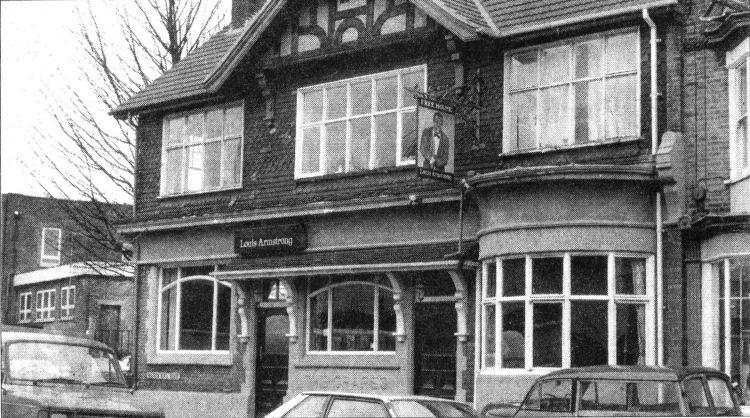
A magnet for musicians.
HISTORIAN Lorraine Sencicle looks at the history of the Louis Armstrong
pub, and its tradition of jazz music.
Originally called The "Grapes", on
what is now Maison Dieu Road, the pub first opened around 1862 but 31
years later it was demolished to allow the road to be widened.
The new pub, which we see today, was set further back.
AN outlet for Bass Charrington, The Grapes was taken over on September
14 1962, by Jackie and Bod Bowles who both had a love of jazz.
Jazz in Dover had been very popular particularly in the
1950's but subsequently declined.
That was until Bryn Lewis,
a bandsman with the Staffordshire Regiment stationed in Dover, persuaded
Bod and Jackie to allow his fellow bandsmen to play jazz at the pub.
NEW-ORLEANS STYLE
It was agreed that Wednesday evening would be given over and quickly the
news of jazz at The Grapes, spread.
That was 1964 and by the end of the following year, famous local jazz
musicians including Ian Shawcross, Jeff Miller, Gunner Yates, Barry
Cole, Paul Jury, Les Feast, Dave Corsby and Barry Judge were playing
there regularly.
This motivated Bod, who played trombone, to form his own band which
became a regular Sunday evening treat.
The original line up included Pete Stevens on drums and Pete Mercer on
banjo, with their respective wives, Judy and Jean, helping Jackie behind
the bar.
The reputation of the jazz
at the Grapes was such that unless you arrived very early, there was
little chance of getting into the overcrowded bar!
The popularity was such
that in 1971, Jackie and Bod persuaded the brewery to change the name to
Louis Armstrong, who had just died.
A new sign was commissioned, the pub redecorated, and the Louis, as the
pub quickly became known, was opened in May 1972.
While the famous jazz musician Chris Barber played at the pub that
night, an old Paris bus, with an open back platform, trundled around
Dover.
The passengers - which
included me - gave out
Pernod to eager Dovorians, accompanied by Bod's jazz band on the upper
deck.
Afterwards, we returned
to the Louis, and joined an estimated crowd of 600 to hear Chris Barber,
Pat Halcox, John Cracker, George Webb, and Johnny McCullam with some 20
other jazz musicians playing!
Jazz on a Sunday evening at the Louis was one of the town's main
attractions and LPs 'were produced, by Ron Nunn, of live sessions.
The line-up of Bod's jazz
band over the next few years included locals Bill Barnacle, Pete
Stevens, Jim Beechy,
Dave Fairfoul, Steve Mellor,
Ian Turner, John Talbot, Mick Marsh, Arthur Collingson, Pete Mercer,
Bruce Roberts and Colin Hodges.
One of the highlights of Dover's social calendar was the annual Boxing
Day party featuring trumpeter Pat Halcox, who usually spent Christmas in
Lydden.
A second "grand opening"
took place in 1980 following
the purchase of the Louis by Jackie and Bod who completely redesigned it
as open-plan to give more room.
The famous clarinettist, Monty Sunshine along with Alan Gresty, Ken
Bawton and the unforgettable Beryl Brydon, were there to ensure that the
evening went with a swing.
Shortly after Bod's band
broke up, but the Sunday evening sessions were given over to other local
jazz bands, "particularly Bill Barnacle's band.
The pub remained a magnet for other musicians who would sit in on jam
sessions, including Topper Headon of The Clash.
Chris Barber hosted the
silver anniversary of the pub and five years later, the 30th anniversary
was celebrated with a hog roast, in the company of Phil Mason's band,
which included Trefor Williams who still plays on Sundays.
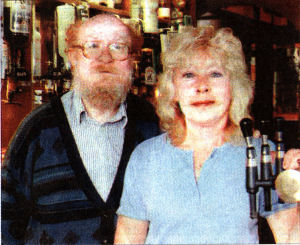
WHEN Bod Bowles died
in October 2000, Jackie organized a New Orleans jazz-style send off for
him.
A black horse-drawn hearse followed by 20 to 30 jazz musicians and
hundreds
of friends and supporters walked from the pub to
St Paul's Catholic Church. Jazz continued to be played both outside and
inside the church.
The wake that followed, held at the Louis, was led
by Pat Halcox, George Webb and many others paying their own tribute to
Bod. Since then, jazz at the Louis has continued, with bands from all
over the world, as well as Charlie Conner, Roger Howlett, Clive Fletcher and
Robin Beams.
|
|
From an email received 13 September 2012
Hello,
I would like to submit three photos taken in 1969 with the Bod Bowles
Jazz Band. The pub was known as The Grapes later renamed the Louis
Armstrong. I had the pleasure of playing with the band on Sunday
Evenings when the regular Clarinettist Steve (Customs and Excise) was
relocated.
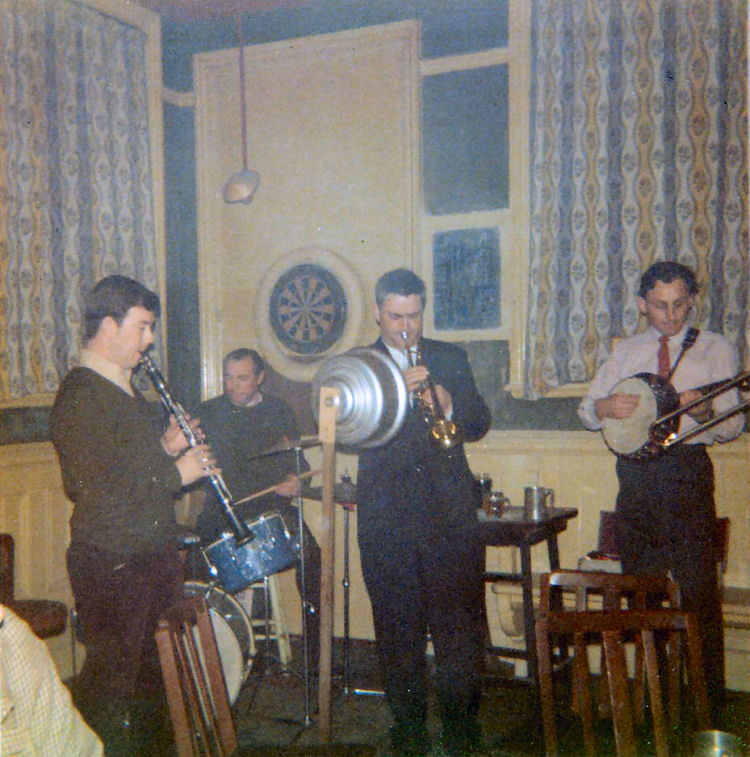
I was serving as a Bandsman with the Loyals Regimental at Connaught
Barracks. Two of the photo's I believe were taken at Shorncliffe
Barracks Family Day, the other was taken in the pub before the
alterations. The two outdoor photos depict Bod leading his Jazz Band.
I congratulate you both on the work / information you have gathered
particularly the names of people who have played and supported The
Grapes / Louis Armstrong. There is one name I am very pleased to hear..
Jackie Bowles, the landlady, what a lovely person. I was Saddened to
hear of Bod's departure, by the sounds of it Jackie arranged one
hell-of-a send off, very fitting.
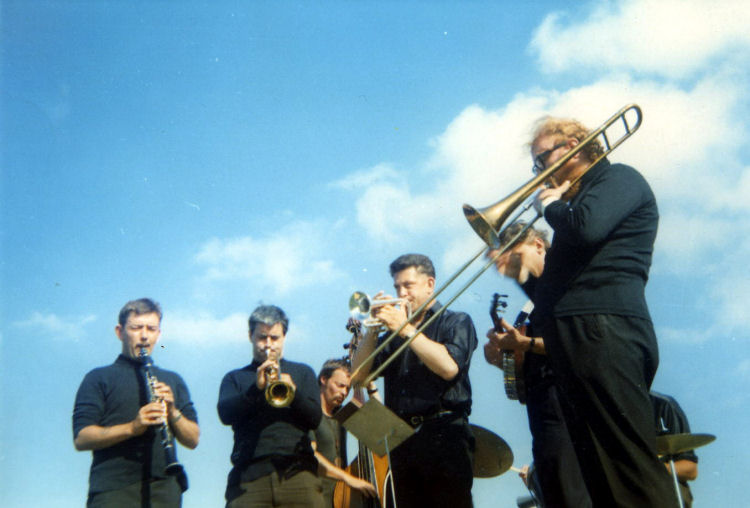
The band members: if I recall correctly are:
Trombone: Bod Bowles (Landlord)
Banjo : Pete Mercer (Garage Proprietor)
Drums : Pete Stevens ( Pig Farmer)
Bass : Dave Fairfowl (A great guy: who was a flower power enthusiast)
Trumpets: Bill Barnicle who formed the Bill Barnical Jazz Band.)
Clarinet: Charles Dobson (Serviceman/Aerospace Buyer now a retired
granddad)
In the interest of accuracy I suspect Jackie or the Pete's would know
the names of the Bass & Trumpet players.
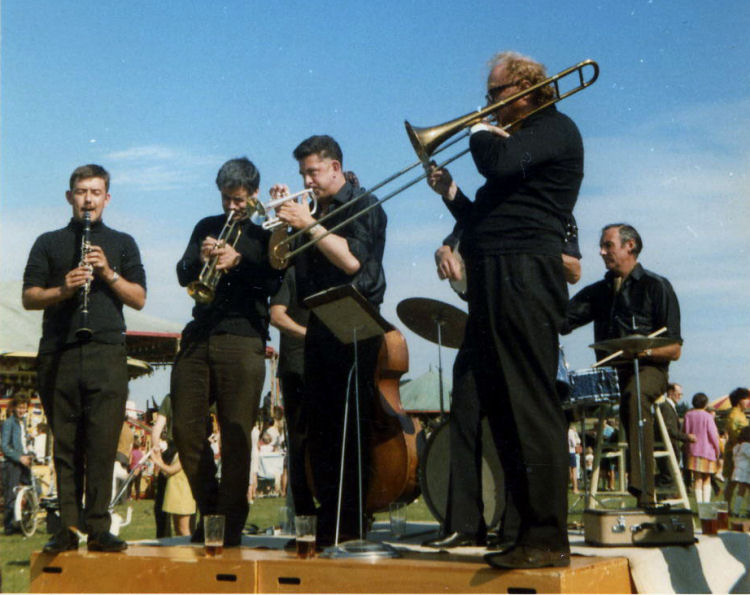
Best Regards
Charles Dobson |
LICENSEE LIST
SPILSTEAD Alfred 1862
PARSE John to Jan/1867

WILSON William Charles Jan/1867-May/72


MONNILAW/MONEYLAWS George May/1872-73+ LAWS George Money
 
SCOTT 1873
GRAY William Henry 1876-June/1913 (widower age 79 in 1911 ) )
          
THOMPSON George June/1913+

NOAKES H to July/1915
 (went
back into Services) (went
back into Services)
ELMS A C July/1915-19 end

ELMS Mrs 1919-22
DANE A E 1922

RALPH George Arthur 1924-Aug/40
    
DREDGE Bertram Charles Aug/1940+ (Thompson & Son secretary)

HOGG Thomas 1944-49 end

ANDERSON David M & HOPKINS Horace Wilfred 1949-17-Aug-51 end
 
HOWKINS George David (brewers district manager) & HOPKINGS Wilfred 17-Aug-1951-52

CASE Robert H 1951-53

PRICE M J E 1952-55
HOPKINS Horace 1951-53 (manager)
PINDER James C 1955-29/Mar/57

MAY Charles E 29/Mar/57-26/Oct/62
BOWLES Robert William (Bod) Grapes 26/Oct/1962-72 end

|
From the Dover Express, 17 August 1951.
(With regard to the above license transfer, Mr. G. W. Hardman
(Magistrate) explained that the
transfer was on account of Mr. Anderson, formerly Secretary of Messrs. Thompsons, the brewers, and the new joint licensee, Mr. Howkins, was
Secretary to the parent Company, Messrs. Charringtons. Mr. Hopkins was
the manager.
Similar considerations applied in the case of the "Golden Cross", St.
James' Street, and the "Granville Hotel," Townwall Street - both of which
licenses were in suspense - and the "Wheelwrights Arms," Drydren Road. In
each of these cases, the licences were transferred from Mr. Anderson to Mr.
Howkins.
|
|
From an email received 4 April 2010.
My grandmother, who was born in 1899 whose name was Elizabeth Keeler,
lived in Peter Street and used to look after the twins who belonged to
Mrs. Elms the licensee of the "Grapes." The children were called Bertie
and Vera. One of the stories she used to relate was that she was so
upset when little Bertie died from diphtheria (age about 3) that she
herself became really ill. From the Licensee names and dates in your
list, it appears that Mrs Elms took over the pub from her husband, so I
am thinking maybe she was widowed in 1919, when the twins would have
been not much more than babies, which would have made little Bertie's
death even more poignant. (See photo of "Friend
in Need" 1919 peace treaty.)
My grandmother went on from there to work at The "Valiant Sailor" as
a barmaid and that, I think is where she met my grandfather, her future
husband Denniss Driscoll... who was no doubt one of her customers!
Maggie Francis.
|
 From the Post Office Directory 1874 From the Post Office Directory 1874
 From the Post Office Directory 1878 From the Post Office Directory 1878
 From the Post Office Directory 1882 From the Post Office Directory 1882
 From the Post Office Directory 1891 From the Post Office Directory 1891
 From Pikes Dover Blue Book 1895 From Pikes Dover Blue Book 1895
 From the Kelly's Directory 1899 From the Kelly's Directory 1899
 From the Post Office Directory 1901 From the Post Office Directory 1901
 From the Post Office Directory 1903 From the Post Office Directory 1903
 From the Kelly's Directory 1903 From the Kelly's Directory 1903
 From Pikes Dover Blue Book 1909 From Pikes Dover Blue Book 1909
 From the Post Office Directory 1913 From the Post Office Directory 1913
 From the Post Office Directory 1922 From the Post Office Directory 1922
 From Pikes Dover Blue Book 1924 From Pikes Dover Blue Book 1924
 From the Post Office Directory 1930 From the Post Office Directory 1930
 From Pikes Dover Blue Book 1932-33 From Pikes Dover Blue Book 1932-33
 From the Post Office Directory 1938 From the Post Office Directory 1938
 From Pikes Dover Blue Book 1938-39 From Pikes Dover Blue Book 1938-39
 From Pikes Dover Blue Book 1948-49 From Pikes Dover Blue Book 1948-49
 From the Kelly's Directory 1950 From the Kelly's Directory 1950
 From the Kelly's Directory 1953 From the Kelly's Directory 1953
 From the Kelly's Directory 1956 From the Kelly's Directory 1956
 From the Dover Express From the Dover Express
|








